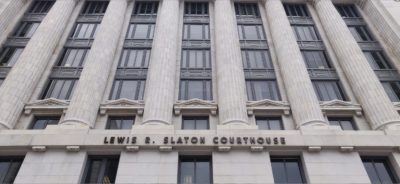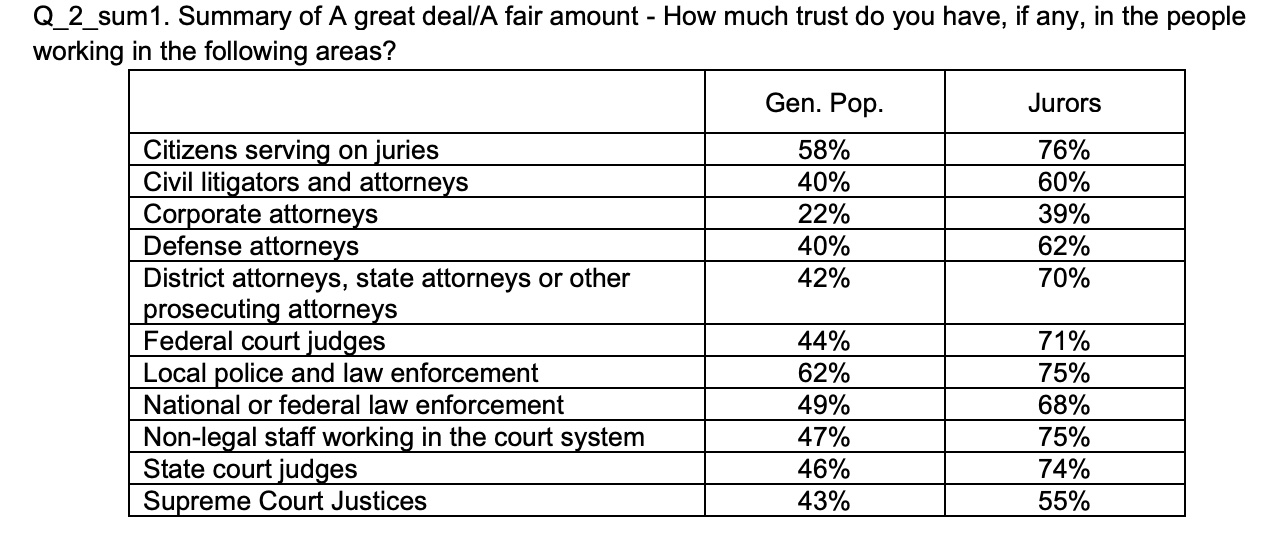by Bill Murray

This month’s travel column includes suspiciously little travel – just two short walks, to a courthouse and a jailhouse. I live in Atlanta, where quite a bit of national politics has happened in those two buildings these last few weeks.
I walked downtown a couple of weeks ago when things were going on down there that you wouldn’t call festive, August is too hot for festive, but they were purposeful, and expectations ran high. Peoples’ opinions diverge, don’t they, but until the Trump indictments were actually handed up August 14, everybody at least agreed something important was coming and that it would shape events.
To walk from my part of town, Atlanta’s big busy Midtown, to the sprawling government complex downtown, is to walk “right down Peachtree,” as much loved Atlanta Braves baseball announcer Ernie Johnson used to say when describing a pitch right down the middle.
From Midtown you walk Atlanta’s main street a couple of miles south. There’s a dodgy block or two and then a positively anti-human overpass where noise, grit and gridlock coalesce over a squeezed together forced marriage between interstates 75 and 85. We call that the Downtown Connector.
Once that’s over you forge alongside Woodruff Park (for sixty years Robert W. Woodruff personified Coca-Cola); you are now in the heart of downtown, and continue beyond an iconic neon Coca-Cola sign and through the disused entrance to what has been, on and off again, Underground Atlanta.
After that barriers were up, roads were shut and cadres of traffic cops moved about. TV trucks staked out the Lewis R. Slayton Courthouse for a couple of weeks down there and everybody with a supporting role in presenting the Donald Trump drama, TV techs, cops, drivers, caterers, couriers and a few protesters deserved hazardous duty pay for managing in the 100 degree-plus daily heat.
Out here in the provinces these felt like important events; it seemed like purposeful people were busy with weighty affairs, even if it was only all in the service of getting one man and his associates in trouble with the law.
•

As a young and eager applecart upsetter, William F. Buckley asserted that for governance, he would trust the first two hundred people in the phone book over elected politicians. Speaking in 1961, he meant to troll the Ivy League and its liberal bias. In his trolling Buckley would fit right in today as a 2023 anti-woke MAGA agitator.
His broader contention remains as familiar today as sixty years ago, that the governing classes are arrogant, privileged and out of touch with the common people. And his idea – that at governance, the public at large outperforms politicians – might well be right.
It’s an idea called sortition, a system of choosing citizens randomly to deliberate on a particular issue. Both the ancient Greeks and some cities in Renaissance Italy used it to select major political officials, and we use it today when we pick juries.
I’ve been looking at polls about Americans’ woeful and plunging faith in our institutions and, in support of the idea of sortition, faith in the idea of trial by jury ranks near the top.

It’s a simple idea that appeals to common sense. Jurors are chosen for a limited time, with limited writ, they do their jobs and then return to private life. They don’t have the opportunity to invite popular disdain by accruing personal benefit in the process, as so many politicians do.
Otherwise, a wealth of polling suggests faith in American institutions is at or near historic lows, in business, the military, the police, medicine, the church, the Supreme Court and especially, Congress. In contrast, a solid majority of Americans in that Ipsos survey profess faith in jury service, and the number goes up when people are asked after actual service on a jury.
Which, like everything else, brings us to Donald Trump. Whatever the outcomes, the coming Trump trials will anger half the country. What are we left with when this remaining slender reed of popular faith in America is undercut?
•
The Watergate trials took almost a decade to resolve (See Michael Liss’s completely great play-by-play of Watergate history here on 3QD), and the Trump trials could too. The January 6th assault on the Capitol is already 979 days in the past, and law enforcement has been working at the speed it should — deliberately.
First the legal process focused on smaller actors, the individual people stirring up trouble around the capital on January 6th. On September 1st a prominent ‘Proud Boy’ got eighteen years in prison, and then last Tuesday the former Proud Boys leader Enrique Tarrio, after pleading for leniency, was sentenced to 22 years.
Those first prosecutions having moved through the courts, now investigations in several states are focusing on mid-level local and national Republican politicians, many of whom furthered Mr. Trump’s fake elector frauds, and indictments are now being issued.
Early last week an IT guy at Mar-a-Lago struck a cooperation agreement with prosecutors in the former president’s classified documents case. In the state case here in Georgia, some of the nineteen indicted and thirty unindicted co-conspirators may be expected, after looking at months long trials and lawyer fees, to turn against Mr. Trump too, in the process possibly implicating those further up the line.
A long judicial process looms. Given that the Watergate trials took almost a decade, one wonders if local Fulton County District Attorney Fani Willis might be pursuing some sort of Mr. Trump-related prosecution for the rest of her career.
An arresting (forgive me) and oft-opined upon question around all these Trump prosecutions is what you might call the surgical nature of Special Prosecutor Jack Smith’s indictments, separating Mr. Trump from his alleged co-conspirators and paring back the language in his indictments to bare bones, versus the blow by blow unrelentingness of the Georgia case.
Which is better? As far as prosecutorial effectiveness, we’ll see, but in the service of seeing things through and getting the story told, the answer is pretty clearly the tandem of both.
•

Fifty years ago America was a different country. In the 1970s remember, getting access to transcripts of presidential conversations – the Watergate tapes – was a closely fought process that, once achieved, sealed Richard Nixon’s fate. Fifty years later without any legal process and before any trial we already have in hand a remarkable document.
Close as Atlantans are to the Trump Georgia case, I’ve felt it my duty to read the transcript of that famous phone call with our Republican Secretary of State Brad Raffensperger, and it turns out to be a revelation. For example:
Trump: “I mean, look. Brad. We have a new tape that we’re going to release. It’s devastating. And by the way, that one event, that one event is much more than the 11,000 votes that we’re talking about. It’s uh, you know. That one event was a disaster. And it’s just, you know, but it was, it was something, it can’t be disputed. And again we have a version that you haven’t seen but it’s magnified. It’s magnified and you can see everything. For some reason they put it in three times, each ballot, and I don’t know why. I don’t know why three times. Why not five times, right? Go ahead.”
‘We have a version that you haven’t seen but it’s magnified.’ That is so Donald Trump. In Trump world, everything is bigger. Consider:
Trump attorney Cleta Mitchell: “I will tell you. I’ve seen the tape. The full tape. So has Alex. We’ve watched it. And what we saw and what we’ve confirmed in the timing is that. They made everybody leave, we have sworn affidavits saying that. And then they began to process ballots. And our estimate is that there were roughly 18,000 ballots. We don’t know that. If you know that … “
Ms. Mitchell spoke like a lawyer, with room to backtrack. Then up steps the president.
Trump: “It was 18,000 ballots but they used each one three times.”
Mitchell: “Well, I don’t know about that.”
Trump: “I do think because we had ours magnified out. Each one magnified out is 18 times three.”
See, it’s eighteen times three because he had his magnified out. Picture now the blustering New York property heir wedged behind his desk, certain of his persuasive powers, commanding the room as in his former career, the facts be damned.
Itsy bitsy difference: the presidency is no longer New York real estate.
One more short excerpt:
Trump: Do you think it’s possible that they shredded ballots in Fulton County? Because that’s what the rumor is. And also that Dominion took out machines. That Dominion is really moving fast to get rid of their, uh, machinery.
Do you know anything about that? Because that’s illegal, right?
Germany: This is Ryan Germany. No, Dominion has not moved any machinery out of Fulton County.
Ryan Germany was at the time General Counsel for the Georgia Secretary of State’s office.
Trump: But have they moved the inner parts of the machines and replaced them with other parts?
Germany: No.
Trump: Are you sure, Ryan?
Germany: I’m sure. I’m sure, Mr. President.
Kudos here. Mr. Germany is a 39 year old lawyer from a Republican suburb north of Atlanta who has gone into private practice since the phone call, joining the Atlanta office of a law firm based on the Georgia coast. He does not appear dazzled by the New York property developer president.
•

The week after my walk downtown the focus of the politics and media worlds turned to an industrial area a couple of miles from downtown Atlanta, out near Norfolk Southern’s rail yard, backed up to a 95-acre data center. This was the Fulton County jail on Rice Street, where the former president was to surrender to authorities. So I walked over there, too.
No purposeful striding to get there though; it’s not at all like the walk down Peachtree Street. You approach the Fulton County jail more like you might shuffle into a pool hall where you have a bad debt – ideally at night, by the back door, furtive and with eyes downcast. It is not a hopeful place.
If a good stout walk to the courthouse through Atlanta’s prospering business districts held the promise of justice, the walk to the jail offered only vague unease, a look over your shoulder and a trudge thru a discarded part of the city.
A 35-year-old man from Winter Haven, Florida who was unable to make $2500 bail died last September allegedly “eaten alive by bedbugs” in his jail cell here. Ten detainees have died in this jail so far in 2023. Six of those deaths have occurred within the last two months. It is underfunded, by accounts crumbling and self-evidently atrocious.
Former President Trump staged a thirty vehicle motorcade out of New Jersey, posing as if his every movement required so many vehicles and yes, even two ambulances. It’s fun to wonder what function the random person in car number seven, or nine, carried out in furtherance of Mr. Trump’s trip to Georgia.
There was no Chamber of Commerce path for Mr. Trump’s motorcade, once he arrived at the Atlanta airport, to get to the Rice Street jail. The Atlanta Police Department’s chosen route made it immediately clear this was the last place Donald Trump would ever in his life choose to bring his preposterous parade. (Possible exception: shithole countries.)
Along Joseph E. Lowery Boulevard, named for an iconic civil rights preacher and co-founder of the Southern Christian Leadership Conference, and Donald Lee Hollowell Parkway, named for a civil rights attorney who successfully sued to integrate Atlanta Public Schools, there is the typical broken urban tableau of liquor and dollar stores, check cashing businesses and busted up sidewalks.
You’ll find Elmo’s collision center. On Jefferson Street you might enroll at World Famous Vertical Joe’s, offering courses in pole dance and twerking. There’s Cagle and A Second Chance bail bondsmen and a razor wire-lined lot full of parked trailers.
I found a paucity of pedestrians and I was okay with that. Most of those of us who were there were absorbed in our podcasts, or music, or something, shunning contact with others, enclosed in earphones, isolating ourselves from those who may have had less than the best intent.
The jailhouse’s job different from a courthouse. It fits naturally in more of an industrial neighborhood, and it throws off an entirely different vibe, mostly of defeat and desperation. Which is the very reality of daily life for some people in the neighborhood, where something bad happens every day. And which, just because he doesn’t live here, doesn’t make it any less real, or perilous for the former president.
 “I don’t quite know how I feel yet except it’s surreal,” said CEO Charles Shaw of Foster Bail Bonds, LLC, who became the first person to bail a former president out of jail. Mr. Trump was booked amid endless media attention that Thursday night. Maggie Haberman reported that “Trump was allowed to report his own vitals, such as eye color, weight and height,” which accounts for the claim that the former president weighs 215 pounds.
“I don’t quite know how I feel yet except it’s surreal,” said CEO Charles Shaw of Foster Bail Bonds, LLC, who became the first person to bail a former president out of jail. Mr. Trump was booked amid endless media attention that Thursday night. Maggie Haberman reported that “Trump was allowed to report his own vitals, such as eye color, weight and height,” which accounts for the claim that the former president weighs 215 pounds.
•

There is evidence that the former president is coming to realize the gravity of his situation. Last Tuesday Special Prosecutor Jack Smith accused Mr. Trump of making daily statements that threaten to prejudice the jury pool.
Still, Donald Trump can’t seem to help returning to the well of his best supporters, for money and for moral support, though moral is a funny word in this context. I’m going to guess some of the former president’s behavior this summer will look more like panic than prudent planning in retrospect.
There are epic times to come. In mid-August Mr. Trump wrote on his social media channel:
“A Large, Complex, Detailed but Irrefutable REPORT on the Presidential Election Fraud which took place in Georgia is almost complete & will be presented by me at a major News Conference at 11:00 A.M. on Monday of next week in Bedminster, New Jersey.” That never happened.
The next day, apparently after legal advice, the former president wrote that he would no longer hold that event. Cooler heads, for the moment.
Yet in the end, as always, he just can’t quite stop himself, as in the transcript of this video:
“This is the final battle. With you at my side we will demolish the deep state, we will expel the warmongers from our government, we will drive out the globalists, we will cast out the communists, Marxists and fascists, we will throw off the sick political class that hates our country, we will rout the fake news media and we will liberate America from these villains once and for all.”
We’ll see.
•
I write things like this twice a week at Common Sense and Whiskey. Please join me there.
